817 Search Results for praactical teaching
July 3, 2017
by Carole Zangari -

Looking for ways to up your game in using technology in your therapy and teaching? Then you may well appreciate a website devoted to John O’Sullivan’s book, UDL Technology: Technology for Universal Design for Learning and Special Education. The site features sections on: File sharing Interactive whiteboards Projecting with a tablet Instant student feedback Presentations and representations of information Library Math Science Literature Social studies Learning a language Writing Fine arts Maker space Notes Memory Special education Occupational therapy Speech and language AAC Behavior AT for physical disabilities Preschool And more. In each area, there are multiple suggestions for specific programs, apps, and web tools that are tried and true. Many of the tools can be used for multiple purposes, so don’t shy away from checking out sections that don’t seem to relevant to your work. You just might find a hidden gem! This site is valuable both as inspiration... [Read More...]
June 15, 2017
by Carole Zangari -
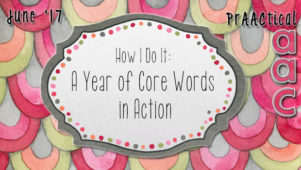
Some of the best resources are the ones that we can modify to use in ways that fit our own specific needs. In this post, SLP Kim Hurley, a graduate of Indiana University, shares her experiences in experimenting with the Year of Core Vocabulary approach. Kim has spent the past 15 years as a specialist for students with moderate and severe disabilities or complex communication needs in educational settings. Currently, she is employed by Forest Hills Special Education Cooperative, serving students in rural Monroe and Owen Counties in south central Indiana. Enjoy! :::::::::::::::::::::::::::::::::::::::::::::::::::::::::::::::::::::::::::::::: For the past 15 years, I have been working as an SLP serving public school students who have moderate to severe disabilities or complex communication needs. Several students benefit from various forms of augmentative communication, and in my years of work I have come to appreciate the flexibility that a robust, core word based system provides. However, when... [Read More...]
June 1, 2017
by Carole Zangari -
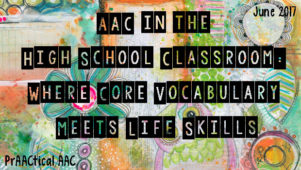
Today, guest blogger Sarah Mueller, a special education teacher in Rochester Michigan, shares her thoughts on supporting core vocabulary learning while working on functional life skills. Sarah teaches high school students with intellectual and developmental disabilities and strives to embed language and communication throughout her students’ entire school experience. Sarah helps her students become strong self-advocates as they prepare for adult life. Marlene Cummings, Sarah’s colleague and mentor, introduces the post. :::::::::::::::::::::::::::::::::::::::::::::::::::::::::::::::::::::::::::::::::::::: I (Marlene Cummings) had the pleasure of meeting Sarah 2 years ago as a new teacher in one of my districts. She immediately engaged in our county level professional learning opportunities in AAC and Literacy. The AAC focus presented strategies to support AAC and language learning including: core vocabulary, aided language input, vocabulary instruction and opportunities. The literacy focus was designed to create and implement a comprehensive literacy program taught by Drs. Karen Erickson and David Koppenhaver. The outcome:... [Read More...]
May 18, 2017
by Carole Zangari -
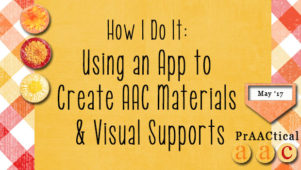
When we think of AAC apps, expressive communication and voice output generally come to mind. But there are other kinds of AAC apps, too, including those that are used to create printable materials. Today, we hear from a clinician who uses this kind of AAC app on a regular basis. Georgia Karavias is a speech language pathologist whose career has centered around working with school-aged children and adolescents who have physical disabilities and communication difficulties. Georgia is passionate about utilizing alternative access methods and inclusive technologies to enable independent communication using AAC systems. She currently works at Scope’s Communication and Inclusion Resource Centre (CIRC) as part of the communication access team in a community capacity building role. In this post, she talks about how she uses AAC and visual supports created with an app developed at her workplace. :::::::::::::::::::::::::::::::::::::::::::::::::::::::::::::::::::::::::::::::::::::::::::::::::::::::: I am a speech pathologist who has worked with children with complex... [Read More...]
May 11, 2017
by Carole Zangari -
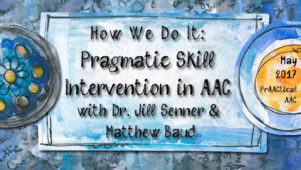
Better Hearing and Speech Month is in full swing and we are excited to see SLPs talking about tools and strategies for supporting people with AAC needs. Many individuals with AAC needs have difficulty using language in expected ways, particularly in social interactions. In this post, we welcome back guest authors Jill Senner and Matthew Baud to discuss ways in which they target pragmatic language in their clinical work. They have a prAACtical approach to this subject and are generous in sharing AAC resources, including vocabulary/pagesets for some popular AAC apps/SGDs. Enjoy! ::::::::::::::::::::::::::::::::::::::::::::::::::::::::::::::::::::: Chat with Me: Pragmatic Skill Intervention in AAC with Jill E Senner, PhD, CCC-SLP & Matthew R. Baud, MS, CCC-SLP Pragmatic skills, commonly referred to as social skills, play an important role in the successful integration of individuals with disabilities. People with disabilities need adequate social skills to live and be educated in the least restrictive environment, to be... [Read More...]
April 12, 2017
by Carole Zangari -
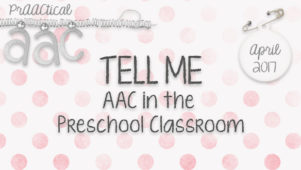
Do you work in or support preschool classrooms? Are you interested in infusing more AAC teaching throughout the day? If so, the TELL ME program may be of interest. This post has an overview of the program I developed with my friend and colleague, Lori Wise, in order to give teachers and therapists a better understanding of ways that they can integrate AAC learning throughout the classroom day. Many thanks to the fine folks at Saltillo for inviting me to do this webinar and for allowing us to share the recording. We are grateful for the support of SLP Joni Nygard and the wonderful team at Attainment for helping us bring this work to fruition. You can download the handout for the video here and see some samples of the TELL ME program here. What works for you in teaching AAC in the preschool classroom? Share your ideas so we can... [Read More...]
March 30, 2017
by Carole Zangari -
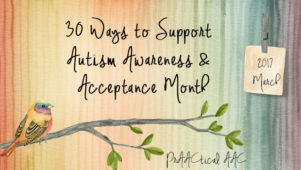
April is just around the corner and that means we’re getting ready to support the acceptance and inclusion of autistic people. Looking for ideas? Here are some to get you started. Treat yourself to some goodies from The Chocolate Spectrum (where you can order online, visit the cafe, or take a chocolate-making class) or other places that employ people with autism. Read and share 5 references that support the use of AAC & Autism. Help your family or community go beyond awareness and into acceptance. Learn and share information about Autism Safety – Be AWAARE! Know an autistic MineCraft lover? Introduce them to AutCraft. Educate yourself on terminology that relates to autism and people with ASD. We may have learned people-first language back in grad school, but there are different points of view on that. This is a great time to learn about identity-first language. Apply your critical reasoning skills to... [Read More...]
March 23, 2017
by Carole Zangari -
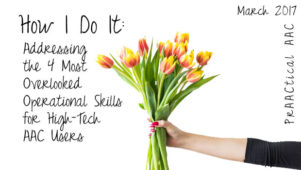
Like many of you, the best part of the work week is when I get to teach language. As amazing as it is to help people with AAC needs become more linguistically competent, we have to be sure not to shortchange some of the operational skills that allow AAC learners to be successful. In this post, SLP Rachel Madel helps us think about supporting the development of operational competence in our AAC learners. The 4 Most Overlooked Operational Skills for High-Tech AAC Users When I first began helping children use high-tech AAC systems, I focused all of my energy on building strong communicators who could navigate through complex systems and use powerful language. I quickly realized that if I wanted to optimize the use of AAC I also needed to teach my students the mechanics of the machines they were using. Once I began teaching basic operational skills, I noticed... [Read More...]
March 16, 2017
by Carole Zangari -
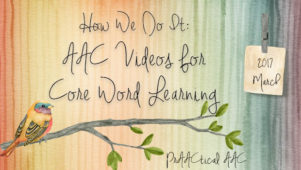
Have you ever thought of making short videos to illustrate the meaning of the core words you are teaching to your AAC learners? If so, this post is right up your alley. Teacher Angie Sheets and SLP Nicole Wingate have teamed up to bring the power of video to core vocabulary instruction and are here to share the fruits of their labor. For the past 17 years, Angie has been teaching Intense Interventions to students from kindergarten through grade 4 at Bluffton Harrison Elementary School. Her AAC experiences range from “DIY on the fly” (anything that can be made in a classroom at little to no cost and meets an immediate need) to high tech. (You can follow her on Twitter @asheetsroom14). Nicole also works for the Bluffton Harrison school system, servicing pre-k through 12th grade students. Her AAC experience includes no tech (e.g., picture boards, PECS), low tech (e.g.,... [Read More...]
March 8, 2017
by Carole Zangari -
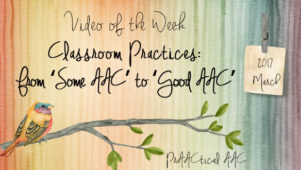
The good news is plentiful. A growing number of classrooms incorporate some form of AAC. Teachers and therapists are increasingly aware of the value of augmentative forms of communication and are recognizing the potential for communication growth in all of their students. School teams are stepping up to provide access to activity-based communication boards, communication books, low tech SGDs, and AAC apps. They are creating opportunities for teaching and using these forms of AAC in specific classroom activities. In many cases, teachers and therapists are growing dissatisfied with the outcomes. Students are more engaged in the activities are improving their ability to participate appropriately. They aren’t always becoming competent communicators who can express themselves independently throughout the day. It’s frustrating to scramble to find and/or create materials and resources, make significant changes to activities, work hard to implement them, and still not get the expected outcome. It’s exhausting. It’s disappointing,... [Read More...]









